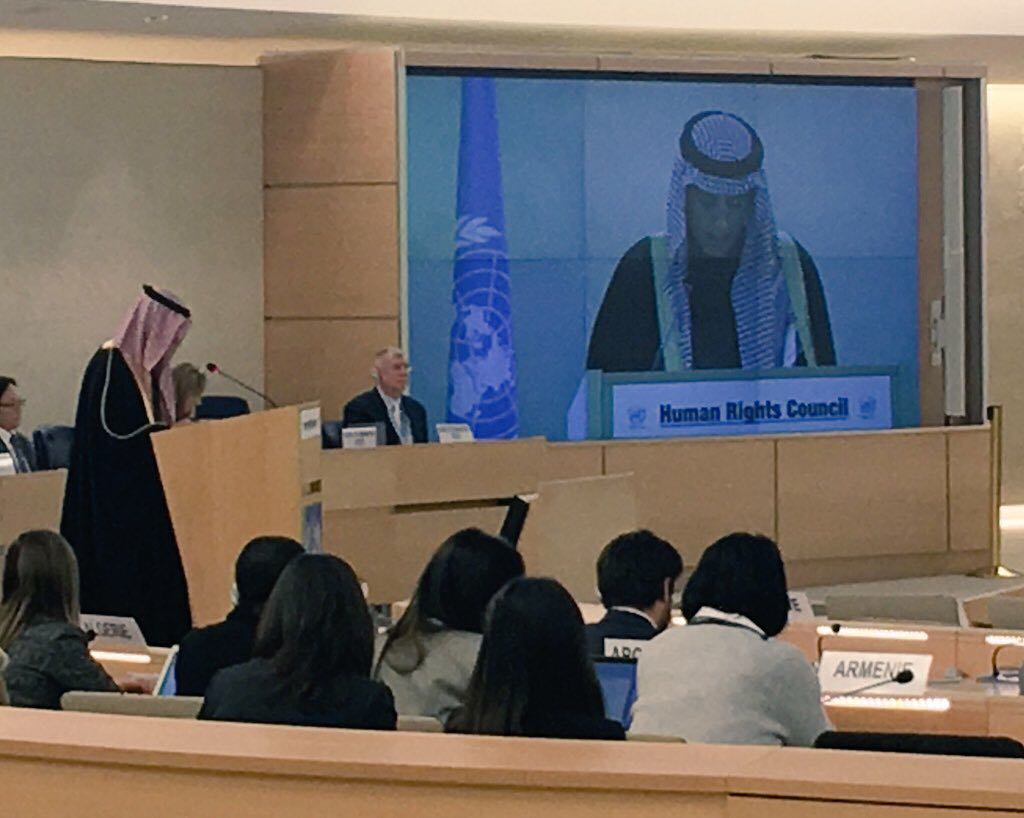27 February 2018 – Today Saudi Arabia’s Foreign Minister, Adel al-Jubeir, delivered remarks at the 37th session of the United Nations (UN) Human Rights Council (HRC) in Geneva during the high-level segment. In his speech, al-Jubeir raised Saudi Arabia’s efforts to fight terrorism around the world as one of the kingdom’s highest priorities. He also addressed the war in Yemen and the humanitarian disaster, blaming the crisis on Houthi forces. Al-Jubeir refused to speak about Saudi abuses in Yemen or domestic human rights concerns, including the detention of dozens of human rights activists, academics, intellectuals, and peaceful dissidents. Americans for Democracy & Human Rights in Bahrain (ADHRB) rejects his mischaracterization of Saudi Arabia’s human rights record and calls on the government to immediately end these ongoing abuses.
During his speech, al-Jubeir stated that fighting terrorism – internationally, regionally, and domestically – is a priority for Saudi Arabia. He then transitioned into a discussion of the war in Yemen, saying that the Saudi-led coalition’s involvement in the conflict remains part of an effort to support Abd Rabbu Mansour Hadi’s government. He blamed the violence and accompanying humanitarian crisis on Houthi forces. Al-Jubeir condemned these forces for blockading villages and preventing transfers of food and medical aid, while simultaneously refusing to acknowledge that the Saudi-led coalition continues to blockade the entire country, forcing millions into famine. Deflecting the kingdom’s portion of the blame for the humanitarian crisis, al-Jubeir stated that Saudi Arabia had launched a humanitarian program that amounted to $10 billion in aid.
While all parties to the conflict are implicated in the worsening violence and humanitarian crisis in Yemen, the Saudi-led coalition is responsible for the naval and aerial blockade that has restricted the amount of food, fuel, and medicine that can enter the country. The coalition is also responsible for conducting thousands of airstrikes against targets in Yemen that include not only military facilities, but also civilian areas, with bombs hitting hospitals, refugee camps, schools, markets, and other critical infrastructure, killing hundreds of non-combatants, including children.
The combination of the blockade and the air campaign has devastated Yemen’s medical infrastructure, contributing to the outbreak of cholera and suspected outbreaks of malaria and diphtheria. As of December 2017, Yemen had more than a million suspected cases of cholera, leading to 2,237 deaths, while the World Health Organization (WHO) estimated that cases of malaria rose in 2016 to 433,000 from 336,000 in 2015. The WHO has also seen a rise in diphtheria cases, estimating that at least 333 people are believed to be infected since an outbreak in mid-August 2017, causing 35 fatalities. According to the WHO, because of the “absence of laboratory confirmation,” the situation has been treated “as an outbreak of suspected diphtheria based on clinical diagnosis,” highlighting that without adequate medical facilities these findings cannot be definitely confirmed as diphtheria.
In his speech, al-Jubeir noted that Saudi Arabia would promote and protect human rights and would work with international human rights mechanisms at all levels. However, in the past several months, Saudi authorities arrested dozens of academics, intellectuals, human rights defenders, clerics, and peaceful dissidents and tried them on spurious terror charges under its overly broad anti-terror law. On 27 February, the same day al-Jubeir spoke in Geneva, the Specialized Criminal Court sentenced rights defender Essam Koshak to four years in prison because of his peaceful human rights activism. While al-Jubeir spoke, Saudi Arabia was undergoing its review under the Committee on the Elimination of Discrimination against Women (CEDAW), where the kingdom’s delegation was criticized for Saudi Arabia’s continued use of the male guardianship over women and its failure to abide by its treaty body commitments to support and promote gender equality.
Husain Abdulla, Executive Director of ADHRB: “Even as Adel al-Jubeir delivered his remarks in Room XX at the Human Rights Council, Saudi Arabia’s delegation to the CEDAW was being roundly criticized for the kingdom’s failure to end gender-based discrimination, and a Saudi court was sentencing a human rights defender to four years in prison for peaceful activism. Clearly, despite its repeat membership in the Human Rights Council, Saudi Arabia maintains only a rhetorical commitment to international human rights standards. As the kingdom consistently flouts this responsibility to uphold human rights and serve as a positive example on the international stage, the the international community must demonstrate that it will not quietly tolerate Saudi Arabia’s continued violation of basic rights and fundamental freedoms.”
In his speech, al-Jubeir appeared to position Saudi Arabia as an upstanding member of the international human rights community, most notably with his sharp rhetoric against terrorism, his pledge of billions of dollars in humanitarian aid to Yemen, and his country’s commitment to working with international human rights mechanisms to promote and protect human rights at all levels. However, the opposite is true, as Saudi Arabia continues to jail dissidents on false terror charges, visit devastating violence on Yemen, and contravene its international human rights commitments. ADHRB therefore condemns al-Jubeir’s misleading statement as an attempt to elide Saudi Arabia’s systematic and widespread human rights abuses.





